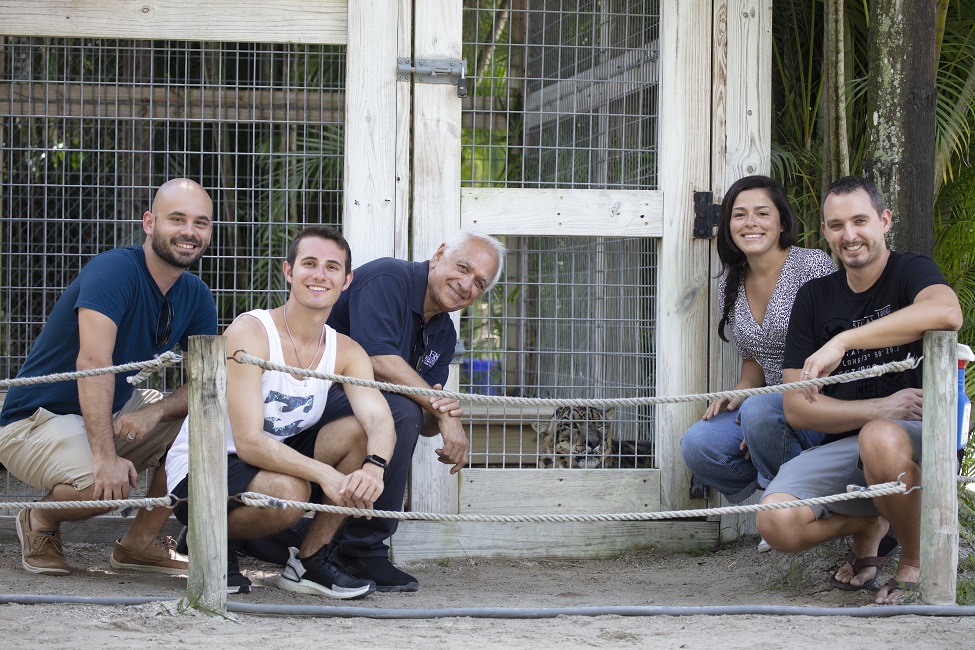The Dog Days of Summer are Here, But this 'Cool' Cat Isn't Worried

Dante, a rescue snow leopard at McCarthy's Wildlife Sanctuary, enjoys lying on rocks and being in a “den-like” environment. Following extensive research and brainstorming, the engineering team came up with the idea of a concrete cooling bed. (Photo by Alex Dolce)
With their thick coats and fur-lined paws that work like snowshoes, snow leopards are perfectly adapted to cold and dry habitats like the Himalayas in Central Asia. However, for one local snow leopard, making him feel at home in South Florida required replicating his natural environment to keep him “chill.”
A student project spearheaded by an engineering professor at Â鶹´«Ă˝Ół»â€™s , resulted in an innovative concrete cooling bed that keeps Dante, a rescue snow leopard at in West Palm Beach, comfortable as temperatures rise during the dog days of summer as well as year-round.
, Ph.D., an associate professor in FAU’s , teaches a solar energy class, which is based on a class project selected by his students. After one of his student’s saw Dante during a visit to McCarthy’s Wildlife Sanctuary, a wildlife rehabilitation facility licensed by the Florida Fish and Wildlife Conservation Commission, the United States Department of Agriculture’s Animal Welfare Act, and the U.S. Fish & Wildlife Service, Department of Interior, his students decided to rally together to come up with a solution.
“Before they could even get started, our engineering students had to examine the biology and behavior of snow leopards as well as Dante’s specific likes and dislikes,” said Abtahi. “For example, Dante doesn’t like air to blow on his face so using fans was out of the question. We also discovered that we couldn’t use water or moisture to cool him off because of the associated risks of bacteria developing within his environment.”
Ěý

What Dante does enjoy doing is lying on rocks and being in a “den-like” environment. Following extensive research and brainstorming, the engineering team came up with the idea of a concrete cooling bed. They pooled their resources and talents – such as welding – to complete the project at FAU’s Boca Raton campus, as well as partially at McCarthy’s Wildlife Sanctuary. The project took them about six months to build, test and install.Ěý
The engineering team created a den-like enclosure for Dante and a concrete cooling bed, which is made from cement and embedded with a heat exchanger and pipes. Cold water circulates through the pipes to cool the surface of the concrete bed to the right temperature to enable Dante to cool off his body. The chiller, which currently runs on electricity, was installed about 60 feet from Dante’s den so that the noise from the equipment does not disturb him. The team at McCarthy’s Wildlife Sanctuary monitors Dante’s behavior and interaction with the concrete bed and adjusts its temperature to keep him comfortable.
Abtahi and his students plan to install solar panels to run the chiller that cools Dante’s concrete bed for the second part of their project if they are successful in securing additional funding. The engineering team also hopes to build an actual den for Dante to create a more natural habitat.
“Our project to help Dante and McCarthy’s Wildlife Sanctuary is a great example of engineering, innovation, education and teamwork coming together to improve quality of life for every living creature,” said , Ph.D., dean of FAU’s College of Engineering and Computer Science. “I applaud professor Abtahi and his dedicated students for their creativity and commitment to making a difference in our community and for supporting the important mission of McCarthy’s Wildlife Sanctuary.” Ěý
McCarthy’s Wildlife Sanctuary has taken in more than 4,000 injured native animals and saved the lives of hundreds of other animals. Mark McCarthy has worked professionally with animals since 1972. He moved to Palm Beach County in 1990 to build the sanctuary, which is located on five acres of slash pine and palmetto forest in West Palm Beach. McCarthy has conducted more than 6,000 wildlife programs that have reached more than 500,000 students in South Florida. Over the years, hundreds of exotic animals, like Dante, have been adopted by the sanctuary and many are now permanent residents. Together with his wife, Aneth, McCarthy and volunteers care for more than 170 amazing animals at the sanctuary. To learn more, visit .
For more information or to support the FAU project for Dante, contact Abtahi at abtahi@fau.edu.
-FAU-
Tags: students | technology | faculty and staff | education | research | community | engineering | philanthropy